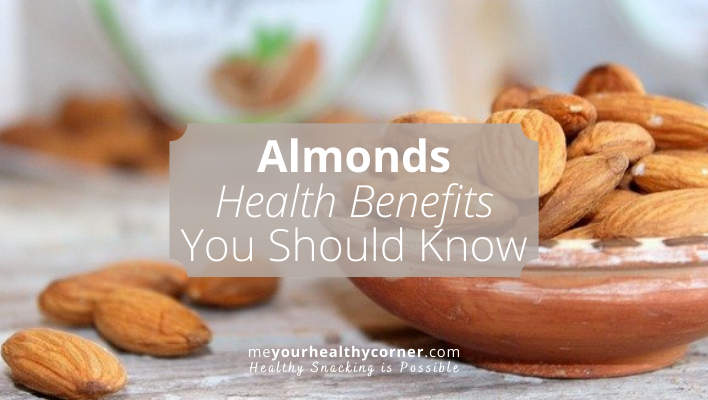I’m more familiar with almonds rather than walnuts. Why? I grew up eating Van Houten whole almonds coated with chocolate, and hazelnuts too but there there isn’t any with walnuts, do they? Well, almonds and chocolates are a perfect match but today, what you and I really wanted to know is what health benefits do almonds have. Read on…
Firstly, get to know a little about almonds’ nutrients.
Almond Nutrition Facts in Brief
A 1-ounce (28g) serving of almonds gives you
- Total Fat: 15g – 19% Daily Value* (DV) out of which only 8% is saturated fat meaning the balance is healthy monounsaturated fat at 66% and polyunsaturated fat at 26%.
- Total Carbohydrate: 5.6g – 2% DV and contain mostly dietary fibre of 3.3g
- Protein: 6g – 12% DV
*The Daily Value (DV) percentage tells you how much a nutrient contributes to your daily diet in a serving.
Almonds also contain a good source of vitamins and minerals including Vitamin E, Vitamin B2 (riboflavin), copper, magnesium and phosphorus.
I am sure you like to know how these components benefit your health. Let’s continue…

Almonds Health Benefits
Here are 10 health benefits of eating almonds.
1. Excellent Source of Vitamin E. Fight Oxidative Damage
Did you know Vitamin E is an antioxidant? Alpha-tocopherol, a major group of compounds in Vitamin E is known chemically as antioxidants.
A 1-ounce serving of almonds, you get 7.3mg that is 32% DV of Vitamin E.
Antioxidants help prevents oxidative damage to your body. You need to know a high level of free radicals can cause oxidative stress and this leads to damage to your body cells thus various diseases arise including heart diseases and Alzheimer’s disease.
2. May Help Slow Progression of Alzheimer’s Disease
Studies show that increased oxidative stress from excess free radicals may damage brain cells and is linked with Alzheimer’s disease (1).
The key finding in a study observed the slowest decline in mental function in the group of participants assigned to alpha-tocopherol.
Another study has tentatively linked a higher Vitamin E intake with a lower risk of Alzheimer’s disease.
3. Boost Heart Health
Similar to walnuts, almonds benefit heart health too.
In a control-study, a group of participants ate what they normally would, while another group consumed snacks of 50g of almonds a day for one month. At the end of the study period, the group eating an almond-enriched diet had higher levels of antioxidants (alpha-tocopherol) in their bloodstream, improved blood flow and lower blood pressure, potentially reducing their risk of heart disease.
4. Lower Cholesterol Levels
High levels of low-density lipoproteins (LDL), also known as “bad” cholesterol in your blood is widely known to cause heart disease.
Almonds are high in fat but it is healthy unsaturated fat. Consumed in moderation, American Heart Association mentioned unsaturated fats may help improve your blood cholesterol when used in place of saturated and trans fats.
Coupled with almonds’ rich source of Vitamin E, an antioxidant, it helps prevent oxidative damage of “bad” LDL cholesterol (1). Oxidized LDL can cause a buildup of fats, cholesterol and other substances in and on your artery walls (plaque), which can restrict blood flow causing cardiovascular disease.
5. May Help Manage Blood Sugar Levels
Almonds are low in carbs but high in healthy fats, protein and fibre. For this reason, almonds are ideal for those with diabetes.
On top of that, almonds have a remarkably high content of magnesium. Many people with type 2 diabetes have low magnesium levels (1). Correcting this deficiency lowers blood sugar levels and improves insulin function (2).
A 1-ounce serving of almonds, you get 76.54mg that is 19% DV of magnesium.
6. May Help Lower Blood Pressure Levels
Magnesium also benefits blood pressure levels. High blood pressure is one of the leading causes of heart attacks, strokes and kidney failure.
A study shows that correcting a magnesium deficiency can lead to major reductions in blood pressure.

Should you not meet the dietary requirement for magnesium, adding almonds to your diet may help.
7. Help Manage Weight
Almonds are high in protein and dietary fibre. Both are known to increase feelings of fullness (1, 2). This can help lose weight as you will be less tempted to eat more snacks.
In a 4-week control study, participants who consumed 43g servings of almonds daily, significantly reduced hunger and the desire to eat. This suggests that almonds may be a healthful snack option.
8. Support Bone Health
Numerous nutrients and dietary components can influence bone health, including magnesium and copper (1).
Magnesium is increasingly recognized as an important contributor to bone health. About 60% of all magnesium in the body is found in bone. In a study on animals, it showed dietary magnesium restriction promotes osteoporosis, fragility and reduction of bone’s mechanical properties. In another study on human, magnesium intake was positively associated with bone mass density.
Copper is an essential trace mineral that has only recently been found to play an important role in bone health maintenance. A published article associated lower copper levels with decreased bone mineral density (BMD) in the total femur and femoral neck.
Almonds contain a relatively good amount of magnesium and copper.
9. May Reduce Risk of Some Cancers
A study on nut consumption and cancer risk concluded that high consumption of peanuts, walnuts, and almonds significantly reduced the risk for breast cancer by 2-3 times. Thus, these nuts appear to be a protective factor for the development of breast cancer.
In another study on animals, after being fed with almond diets twice one week apart for 26 weeks, the result suggests that almond consumption may reduce colon cancer risk and does so via at least one almond component.
10. Support Eye Health
Riboflavin, also known as Vitamin B2 is one of the B vitamins. It is a water-soluble vitamin that is flushed out of the body daily, so it must be restored each day. The best way to get this vitamin is by eating foods that are rich in riboflavin.
In a 1-ounce serving of almonds, you get 0.272mg that is 21% DV of riboflavin.
While Vitamin B is needed for growth and overall good health, it is important for eye health. In an article published on ScienceDirect, vitamin B is needed to protect glutathione, which is an important antioxidant in the eye. Reduced glutathione is the cause of cataract formation.
In a Nutshell
Nuts are said to be nutritionally precious. In this case, almonds can provide you with a range of essential nutrients. They contain lots of healthy fats, fibre, protein, Vitamin E, also an antioxidant, riboflavin that is Vitamin B2 and magnesium.
Almonds’ high antioxidants are excellent in fighting oxidative stress. It is important to manage it as oxidative stress is the root cause of many diseases including heart diseases and Alzheimer’s disease.
The minerals, magnesium and copper present in almonds can help manage your blood sugar as well as blood pressure levels while supporting bone health.
Although almonds are high in fats, most are healthy monounsaturated fat and aren’t likely to cause weight gain. On the contrary, almonds actually help weight loss due to the high fibre contents which makes you fuller and reduces hunger pangs.

As a whole, almonds can support your overall health. Riboflavin, a Vitamin B2 as you know it, helps break down proteins, fats, and carbohydrates. It plays a vital role in maintaining your body’s energy supply. Riboflavin also serves as an antioxidant.
Now you know what health benefits almonds have, would you replace your usual daytime snack with a handful of almonds or add them to your morning breakfast bowl to support your overall health? Tell us in the comments section below. And let us know did this article change your perception of this nut.
It isn’t too late to introduce almonds into your diet. Or you like walnuts more. If yes, read more about walnuts health benefits here.
If you like to buy almonds online, consider using this affiliate link* – shop on Amazon (for US shoppers).
For my fellow Malaysians, use my affiliate link* to buy on Shopee. There is a wide selection with good customer reviews.
*I receive a small commission at no extra cost to you. This allows me to enjoy a cup of coffee while writing and share articles like this one.
Please share this article with anyone you think may find this information useful. Click the share button!
Learn more: Nutty stories & information
Thanks for reading.
Me YourHealthy Corner – Stay in Good Health, Healthy Eating Habits
Disclosure: This blog post contains affiliate links as part of the Amazon.com Services LLC Associate Programs and other affiliate services. This means that meyourhealthycorner.com receives a small commission by linking to amazon.com and other sites at no extra cost to the readers.
Disclaimer: I am not a doctor or medical professional, and this post should not be taken as medical advice. Please do your own research. The material on this blog is provided for informational purposes only. It is general information that may not apply to you as an individual and is not a substitute for your own doctor’s medical care or advice.


I love almonds they are my go to healthy snack, my favorite are the salt and vinegar ones they are so good haha.
I have question though as it pertains to almond milk. Does it still contain the same nutritional value as the almonds themselves or is any of that lost in the process of making the almond milk? I’m not a huge regular milk fan so will continue to use nut milks regardless but was just curious.
I’m glad you asked this question, Brandon because I learned something new today.
There is a difference in nutritional value between almond nuts and almond milk.
Here’s what I found on Livescience – A comparison of the U.S. Department of Agriculture’s nutrient value charts shows that one 8-ounce glass of almond milk contains only 1g of protein, compared to 6g in a serving of almonds. It also has only 1g of fibre, compared to 4g in a serving of almonds. Almond milk has 17g of magnesium vs. 77g in almonds and 1.5g of heart-healthy monounsaturated fats vs. almost 9g in almonds.
Should you want to reap the benefits of almonds, I would strongly suggest consuming almonds nuts. But then there is no harm in almond milk. And it is a good milk alternative for those who are on a vegan diet or with lactose intolerance.
Good Morning Sharon,
Everyday I eat a handful of mixed nuts. I do it for my health and also because I love the taste. Like that I eat fewer cookies with my coffee.
I have a almond tree standing in front of the door. It is a joy when it blossoms.
Almonds are one of my favorite nuts. I have also used almond flour for baking. Thank you for this nice article with lots of good information.
Regards, Taetske
You have an almond tree. That’s wonderful!
Any time of the day, a handful of nuts as snacks is good to fill up the stomach. Better than sugary cookies although it is alright to have them once in a while.
Thanks for following my blog, Taetske. Appreciate it very much.